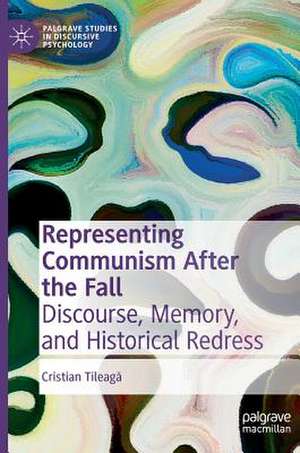Representing Communism After the Fall: Discourse, Memory, and Historical Redress: Palgrave Studies in Discursive Psychology
Autor Cristian Tileagăen Limba Engleză Hardback – noi 2018
This book explores the contribution of discursive psychology and discourse analysis to researching the relationship between history and collective memory. Analysing significant manifestations of the moral vocabulary of the Romanian transition from communism to democracy, the author demonstrates how discursive psychology can be used to understand some of the enduring and persistent dilemmas around the legacy of communism. This book argues that an understanding of language as an action-oriented, world-building resource can fill an important gap in the theorizing of public controversies over individual and collective meaning of the recent (communist) past. The author posits that discursive social psychology can serve as an intellectual and empirical bridge that can overcome several of the difficulties faced by researchers working in transitional justice studies and cognate fields. This reflective book will appeal to students and scholars of transitional justice, discursive psychology, memory studies, and the sociology of change.
| Toate formatele și edițiile | Preț | Express |
|---|---|---|
| Paperback (1) | 328.41 lei 38-44 zile | |
| Springer International Publishing – 14 dec 2018 | 328.41 lei 38-44 zile | |
| Hardback (1) | 390.63 lei 43-57 zile | |
| Springer International Publishing – noi 2018 | 390.63 lei 43-57 zile |
Preț: 390.63 lei
Nou
Puncte Express: 586
Preț estimativ în valută:
74.75€ • 78.25$ • 61.85£
74.75€ • 78.25$ • 61.85£
Carte tipărită la comandă
Livrare economică 07-21 aprilie
Preluare comenzi: 021 569.72.76
Specificații
ISBN-13: 9783319973937
ISBN-10: 3319973932
Pagini: 246
Ilustrații: X, 262 p.
Dimensiuni: 148 x 210 mm
Greutate: 0.48 kg
Ediția:1st ed. 2018
Editura: Springer International Publishing
Colecția Palgrave Macmillan
Seria Palgrave Studies in Discursive Psychology
Locul publicării:Cham, Switzerland
ISBN-10: 3319973932
Pagini: 246
Ilustrații: X, 262 p.
Dimensiuni: 148 x 210 mm
Greutate: 0.48 kg
Ediția:1st ed. 2018
Editura: Springer International Publishing
Colecția Palgrave Macmillan
Seria Palgrave Studies in Discursive Psychology
Locul publicării:Cham, Switzerland
Cuprins
Preface.- Introduction: what does coming to terms with the past mean?.- 1. Transitional justice as situated practices.- 2. Collective and cultural memory: ethics, politics, and avoidance in remembering communism.- 3. Communism as moral problem.- 4. Communism as Other.- 5. Mea culpa.- 6. Remembering with and through archives.- 7. Transgression and the social construction of moral meanings.- 8. Using discursive psychology to explore contested and troubled pasts.
Notă biografică
Cristian Tileagă is Senior Lecturer in Social Psychology at the School of Social Sciences at Loughborough University, UK. His research interests include discursive psychology, prejudice and social exclusion, and interdisciplinarity. He has published widely on these topics.
Textul de pe ultima copertă
This book explores the contribution of discursive psychology and discourse analysis to researching the relationship between history and collective memory. Analysing significant manifestations of the moral vocabulary of the Romanian transition from communism to democracy, the author demonstrates how discursive psychology can be used to understand some of the enduring and persistent dilemmas around the legacy of communism. This book argues that the understanding of language according to discursive psychology – as an action-oriented, world-building resource – can fill an important gap in the theorizing of public controversies over individual and collective meaning of the recent (communist) past. Tileagă maintains that discursive social psychology can serve as an intellectual and empirical bridge that can overcome several of the difficulties faced by researchers working in transitional justice studies and cognate fields. Examining eastern European communism in general and Romanian communism in particular, this reflective book will appeal to students and scholars of transitional justice, discursive psychology and memory.
Cristian Tileagă is Senior Lecturer in Social Psychology at the School of Social Sciences at Loughborough University, UK. His research interests include discursive psychology, prejudice, political discourse and interdisciplinarity, and he has published widely on these topics.
Caracteristici
Offers a new and innovative research agenda for exploring the relationship between discourse, history, and social memory Extends the analysis of personal and social memory to wider societal issues and social problems Considers cultural and political contexts of social change





